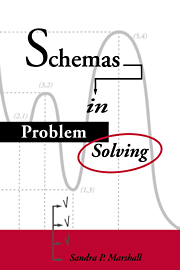Book contents
- Frontmatter
- Contents
- Preface
- Acknowledgments
- I Fundamentals
- II Schemas and instruction
- III Learning from instruction
- IV Schemas and assessment
- V Schema models
- 12 Production systems, neural networks, and hybrid models
- 13 The performance model
- 14 The learning model
- 15 The full schema model
- 16 Some concluding remarks on schema theory
- Notes
- References
- Name index
- Subject index
15 - The full schema model
Published online by Cambridge University Press: 22 October 2009
- Frontmatter
- Contents
- Preface
- Acknowledgments
- I Fundamentals
- II Schemas and instruction
- III Learning from instruction
- IV Schemas and assessment
- V Schema models
- 12 Production systems, neural networks, and hybrid models
- 13 The performance model
- 14 The learning model
- 15 The full schema model
- 16 Some concluding remarks on schema theory
- Notes
- References
- Name index
- Subject index
Summary
This chapter describes the full model of schema implementation in arithmetic problem solving. In current terminology, the model is a hybrid model of cognition, utilizing both production systems and connectionist networks to represent schema knowledge.
As was pointed out in chapter 12, an ongoing controversy in the cognitive science community centers on the nature of the models used to represent cognitive phenomena. The two primary contenders are production system models (such as ACT* and SOAR) and connectionist models (such as those produced by McClelland and Rumelhart or Grossberg and his associates). Critics on both sides argue that the other cannot suffice to capture human behavior. Both appear to be right. Perhaps what is needed is a model that combines the best features–and mitigates the worst features–of both kinds of model. Given the unique and complementary nature of the two approaches–the strength of the production system for modeling sequences of actions and the strength of the connectionist approach for modeling pattern recognition–it is reasonable to anticipate hybrid models that will capitalize on their individual strengths.
A hybrid model of schemas is the focus of this chapter. The defining characteristic of the model is that it incorporates all four components of schema knowledge and models each of them distinctly. In my view, schema knowledge for solving word problems consists of identification knowledge, elaboration knowledge, planning knowledge, and execution knowledge.
Information
- Type
- Chapter
- Information
- Schemas in Problem Solving , pp. 377 - 390Publisher: Cambridge University PressPrint publication year: 1995
